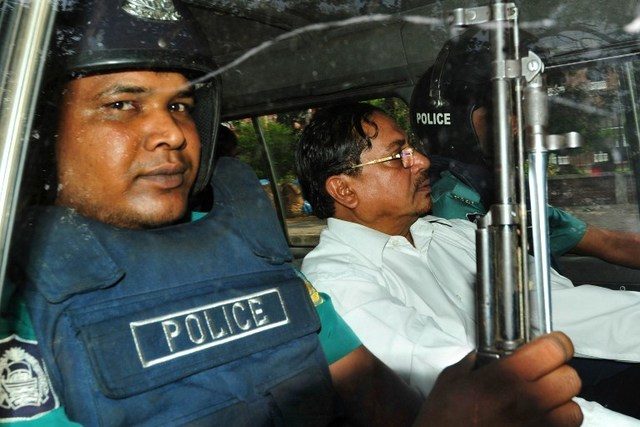SUMMARY
This is AI generated summarization, which may have errors. For context, always refer to the full article.

Police said extra officers were deployed in the capital and other major cities hours after Mohammad Kamaruzzaman, the third most senior leader of the Jamaat-e-Islami party, was executed in a Dhaka prison late on Saturday.
“We’re alert against any bid to create anarchy or violence,” a police spokesman told Agence France-Presse (AFP), saying police and paramilitary officers were patrolling key places to prevent his supporters rallying.
Kamaruzzaman was convicted in 2013 by a controversial war crimes tribunal of carrying out a massacre in a village as head of a pro-Pakistan militia.
Jamaat, the largest Islamist party, called a nationwide “prayer day” for Sunday and a strike on Monday in protest at Kamaruzzaman’s “heinous killing”. The party branded it an act of “revenge and pre-planned murder” by the secular government.
The 62-year-old’s hanging is expected to deepen a months-long political crisis that has seen the Islamists and the main opposition party launch nationwide protests to try to topple Prime Minister Sheikh Hasina.
But the execution is unlikely to trigger the widespread deadly violence that was unleashed after the only other execution for wartime atrocities, also of an Islamist, was carried out in 2013.
Hundreds of Jamaat activists were killed that year when the party held a series of nationwide protests against trials of its leaders by the tribunal, which was established by Hasina’s government.
Security forces have since rounded up thousands of Jamaat supporters in a massive crackdown on the unrest.
Bangladesh went ahead with the execution despite last-minute pleas by the United Nations, the European Union and human rights organizations to halt the hanging. The UN has said the trial did not meet “fair international” standards.
Hundreds of secular activists and supporters of the trials gathered in central Dhaka on Saturday night to cheer and celebrate the death of a man they called a “war butcher”.
Finally we got justice
The Supreme Court paved the way for Kamaruzzaman’s execution on Monday when it rejected his final legal appeal against the death sentence handed down in May 2013.
He was given several days to seek clemency from the country’s president, but refused, telling officials: “My father said only Allah can give or take life, not a president.”
After meeting his family one last time on Saturday, Kamaruzzaman was taken by specially trained convicts to a makeshift gallows where the execution was carried out about 10:30pm (1700 GMT).
Guarded by a convoy of elite security officers, the body was taken to his home village in the north where he was buried in a ceremony attended by about 100 people, local police chief Mazharul Karim told AFP.
Prosecutors said Kamaruzzaman presided over the massacre of at least 120 unarmed farmers who were lined up and gunned down in the northern village of Sohagpur.
The 1971 war between Bangladeshi nationalists, assisted by Indian troops, and Pakistani forces led to the creation of independent Bangladesh from what was then East Pakistan.
Kamaruzzaman’s lawyers argued that he was only 19 when the nine-month war broke out and was too young to have led any militia against independence.
Three women who lost their husbands testified against Kamaruzzaman in one of the most emotive of all the war crimes trials.
“All 32 widows who are still alive are happy the notorious killer has been hanged. Finally we got justice,” said Mohammad Jalal Uddin, a Sohagpur farmer who lost seven members of his extended family in the killing.
At least five other Jamaat leaders have been sentenced to death and their appeals are being heard in the Supreme Court.
Jamaat and other critics say the war crimes trials are mainly aimed at silencing Hasina’s opponents rather than delivering justice.
Hasina’s government says the trials — which lack any international oversight — are needed to heal the wounds of the conflict. – Shafiqul Alam, AFP/Rappler.com
Add a comment
How does this make you feel?
There are no comments yet. Add your comment to start the conversation.